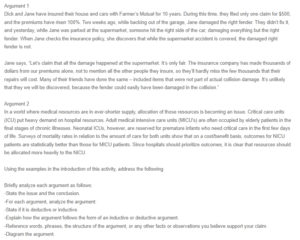Deductive Vs Inductive Reasoning
Argument 1
Claim and conclusion: Cheating insurance companies are valid because they are making thousands of dollars from premiums
Argument: Inductive Reasoning
Analysis:
Inductive reasoning refers to the logical process where several premises that are assumed to be true are combined to arrive at a specific conclusion. This type of reasoning moves from specific instances towards comprehensive conclusions (Liew, Grisham, & Hayes, 2018). In the argument above, Dick and Jane immediately conclude that they need to claim that all the damage happened at the supermarket. They first conclude by thinking of the available options or making arguments for their conclusion. The first premise of their argument is that insurance companies are making thousands from their premiums and all the other people they insure. Therefore, the repair would not affect much of the profits of the insurance company. The second premise is that since many of their friends have cheated on insurance companies before and gotten away with it, they would not be discovered. This is a generalized argument because they believe that they will get away with the claim, just like everyone else is.
These are different and independent reasons for cheating the insurance company to repair the fender that was not part of the collision at the supermarket. My conclusion, therefore, is that cheating on insurance companies is right because they will not lose much, considering the amount of profits they make. After all, everyone else is doing the same and getting away with it – Dick and Jane will also get away with the claim unnoticed. Even though the conclusion was first arrived at before making the premises that support the same, the independent arguments support the conclusion that cheating insurance companies is valid.
Argument 2
Claim and conclusion: Neonatal Intensive Care Units (NICU) should be allocated heavier resources than Medical Intensive care Units (MICU)
Argument: Deductive Reasoning
Analysis:
Deductive reasoning, also referred to as top-down logic, uses generalized principles that are considered to be true about a given subject to arrive at a conclusion. The concordance of several premises determines the conclusions in this form of argument (Liew, Grisham, & Hayes, 2018). In the given argument, the premises support the conclusion that the NICU requires more resources than the MICU. The first premise is that the ICU requires more resources because it handles most patients in their early and later stages of life. Therefore, more resources should be channeled to where they are needed the most. The second premise is that the MICU handles patients in the final stages of their chronic illnesses as opposed to the NICU, which handles premature infants for the first few days of their life. Consequently, the latter requires more attention than the former because chronic illnesses often lead to death, but infants need survival. The third premise is that since the cost/benefit analysis proves that NICU is better than MICU, the former requires prioritization.
Therefore, since hospitals must prioritize outcomes in healthcare service delivery, more resources should be allocated to the NICU. The premises, in this case, are dependent and use the indicator words “if” and “then,” which implies that it is truth-functional. The issue can be stated as follows: if NICU produces better outcomes for the hospital than MICU, then it needs more resources allocated to support infants instead of adults in their later stages of chronic illnesses.
Reference
Liew, J., Grisham, J., & Hayes, B. (2018, June). Inductive and deductive reasoning in obsessive-compulsive disorder. Journal of Behavior Therapy and Experimental Psychiatry, 59, 79-86. https://doi.org/10.1016/j.jbtep.2017.12.001
ORDER A PLAGIARISM-FREE PAPER HERE
We’ll write everything from scratch
Question

Deductive Vs Inductive Reasoning
Argument 1
Dick and Jane have insured their house and cars with Farmer’s Mutual for 10 years. During this time, they filed only one claim for $500, and the premiums have risen 100%. Two weeks ago, while backing out of the garage, Jane damaged the right fender. They didn’t fix it, and yesterday, while Jane was parked at the supermarket, someone hit the right side of the car, damaging everything but the right fender. When Jane checks the insurance policy, she discovers that while the supermarket accident is covered, the damaged right fender is not.
Jane says, “Let’s claim that all the damage happened at the supermarket. It’s only fair. The insurance company has made thousands of dollars from our premiums alone, not to mention all the other people they insure, so they’ll hardly miss the few thousands that their repairs will cost. Many of their friends have done the same – included items that were not part of actual collision damage. It’s unlikely that they we will be discovered, because the fender could easily have been damaged in the collision.”
Argument 2
In a world where medical resources are in ever-shorter supply, allocation of those resources is becoming an issue. Critical care units (ICU) put heavy demand on hospital resources. Adult medical intensive care units (MICU’s) are often occupied by elderly patients in the final stages of chronic illnesses. Neonatal ICUs, however, are reserved for premature infants who need critical care in the first few days of life. Surveys of mortality rates in relation to the amount of care for both units show that on a cost/benefit basis, outcomes for NICU patients are statistically better than those for MICU patients. Since hospitals should prioritize outcomes, it is clear that resources should be allocated more heavily to the NICU.
Using the examples in the introduction of this activity, address the following:
Briefly analyze each argument as follows:
-State the issue and the conclusion.
-For each argument, analyze the argument:
-State if it is deductive or inductive.
-Explain how the argument follows the form of an inductive or deductive argument.
-Reference words, phrases, the structure of the argument, or any other facts or observations you believe support your claim.
-Diagram the argument.

